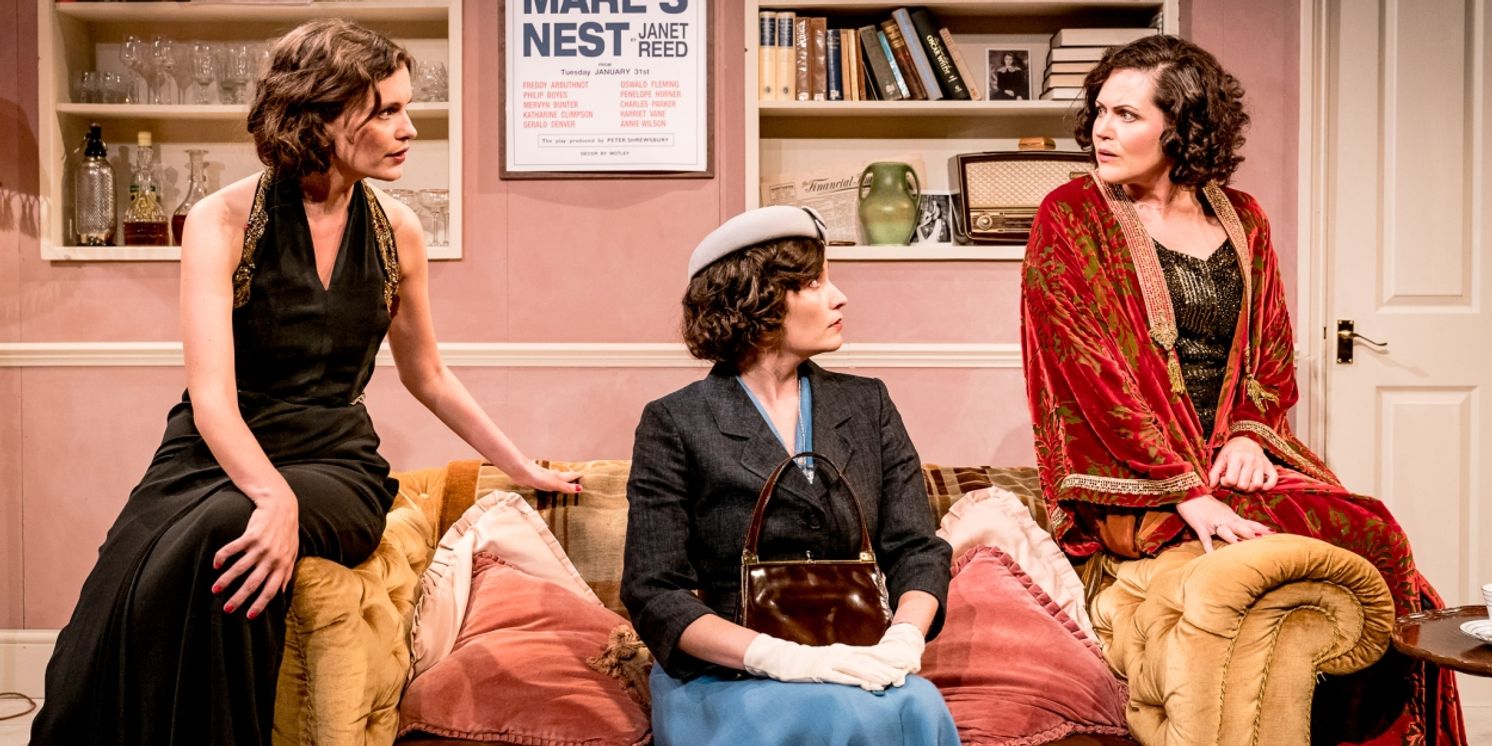Review: LOVE ALL, Jermyn Street Theatre
Artistic Director Tom Littler ends his tenure with a brilliant revival of a neglected Dorothy L. Sayers play.

![]()
An elopement to Venice with a romance author sounded like the most wonderful of circumstances to besotted actress Lydia. But it's been 18 months, her man is busy writing his next best-seller and her time in the city isn't living up to her dreams.
During their absence from London, a new playwright as taken the West End by storm and now Lydia wants a part in her latest play. When the writer turns out to be Godfrey's wife and the play the excuse their divorce is taking so long, the women decide to choose themselves over their traditionalist of a paramour.
Tom Littler goes out with a bang and ends his tenure as Artistic Director of Jermyn Street Theatre with a brilliant revival of Love All. Dorothy L. Sayers might be more famous to the general public for her mystery novels, but her theatrical list of credits is equally witty and atmospheric.
Rarely performed but often described as an anti-romantic comedy, Love All is a jubilant celebration of progressive ideals and an exploration as well as a not-so-veiled critique of the role of women in society. By the end, one could almost describe it as gleefully and positively anti-men.
As directed by Littler, it's deceivingly traditional on the surface but deeply subversive at its core. The staging is rather conventional with its 30s sitting rooms, period furniture, and interwar fashion tying the subject matter to its temporal setting and social class. He leans into the text with steady reliance on Sayers's direct witticisms and unflappably current comedic timing. It's the turns of phrase that make the characters attractive. The cast circle one another with words and clever chemistry, maintaining a visual stillness that belongs to cinema more than theatre.
Emily Barber is a splendidly spoilt, fiery Lydia. She airs her dissatisfaction with her Italian exile in the posh patter of a woman blind to her privilege, but lights up with passion when her job as an actress is brought up. As she grows discontented with Godfrey's placidity, it's a joy to see Barber climb from her appeasing state to being a proper firecracker. In turn, Alan Cox plays a finger-wagging, patronising, weak man prone to flattery.
Godfrey's old-fashioned objections to his women's modern ways turn into a reason for Lydia and Edith to baby him in an attempt to grant each other the freedom to do as they please. It's his need for a spouse who inspires and supports him that needs to be taken care of. Cox never raises his voice or acts intimidating, yet his chauvinistic morals take root with worrisome ease.
Leah Whitaker's Edith is independent and no-nonsense. Her need to prove herself away from her husband's name has her writing under the nom de plume of Janet Reed, much to Godfrey's surprise and dismay. It's his pursuit of Lydia that loosened the chains of their marriage and ended her boredom. She delightfully patronises her own husband in the most blasé and feminist of ways, dropping a "darling" every second word with worldly sophistication. Whitaker and Barber bond beautifully over each other's love for their respective professions, politely ganging up on Godfrey.
Completing the girl power trio of the play is Bethan Cullinane as Ms Mary Birch, Godfrey's secretary, the real romantic in the piece. Cullinane plays a wise, loyal, clever woman whose presence is of delicate discretion. She attends to Lydia and Godfrey all the same, bringing out their shocking similarities with exquisite delight.
Louie Whitemore designs an elegant set. A large painting of the Grand Canal dominates the Venetian scene against dust-pink walls and over a gold velveteen sofa. The stage transforms during the interval, transferring the action from Venice to London: the Grand Canal is removed to reveal shelving, the French windows are walled up, the curtains changed, the furniture rearranged. Stage management deserves recognition for a smooth transition with little to no disruption for the audience in such a small space.
Written in the 40s, it's remarkable how little we have moved from the Love All strife. At a time when marriage and motherhood are still sometimes considered the be-all-and-end-all, the artistic liberation of women is of essence. Sayers always rejected the feminist label given to her in life, but it's difficult not to associate this play with a distinct determination of going past the outdated societal roles arbitrarily given according to gender.
Godfrey revels in being the breadwinner, boasting a subdued wife whom he gets immediately bored with due to her inherent passivity. He wants to save Edith from the horrendous predicament of having a job she loves and enjoys, all the while putting himself at the forefront of her success. When his lover suggests she goes back to work, he is appalled by her gall and belittles her interests. Edith and Lydia can only win by coming together and showing a united front in the face of the patriarchy. It's everybody's fight, and we can only succeed as one.
It's been a glorious run for Littler. In his years at the helm, he turned Jermyn Street's tiny studio theatre into a producing house, single-handedly changing the future of the venue. From Strindberg to Shakespeare and from Brenton to Rattigan, he's collected an enviable portfolio defined by a clear vision. At times somewhat traditional compared to other contemporaries, Littler remains a director whose strength lies in boutique projects with high production value. Orange Tree Theatre are lucky to have him next.
Love All runs at Jermyn Street Theatre until 8 October.
Photo Credit: Steve Gregson
Reader Reviews
Videos

